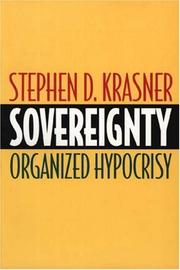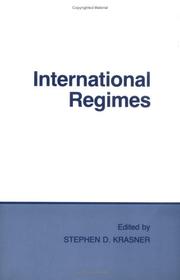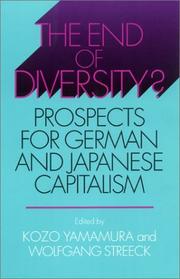| Listing 1 - 10 of 10 |
Sort by
|
Book
ISBN: 9780415774833 9780415774826 9780203882139 020388213X 0415774829 0415774837 9786612016844 6612016841 1135974772 1282016849 9781135974725 9781135974763 9781135974770 Year: 2009 Publisher: London Routledge
Abstract | Keywords | Export | Availability | Bookmark
 Loading...
Loading...Choose an application
- Reference Manager
- EndNote
- RefWorks (Direct export to RefWorks)
Stephen Krasner has been one of the most influential theorists within international relations and international political economy over the past few decades. Power, the State, and Sovereignty is a collection of his key scholarly works. The book includes both a framing introduction written for this volume, and a concluding essay examining the relationship between academic research and the actual making of foreign policy. Drawing on both his extensive academic work and his experiences during his recent role within the Bush administration (as Director for Policy Planning at the
International relations. Foreign policy --- United States --- Hegemony --- International relations --- Foreign relations --- International relations. --- Foreign relations. --- Coexistence --- Foreign affairs --- Foreign policy --- Global governance --- Interdependence of nations --- International affairs --- Peaceful coexistence --- World order --- National security --- Sovereignty --- World politics --- Hegemony - United States --- United States - Foreign relations --- United States of America

ISBN: 9780691007113 069100711X Year: 1999 Publisher: Princeton, N.J. Princeton University Press
Abstract | Keywords | Export | Availability | Bookmark
 Loading...
Loading...Choose an application
- Reference Manager
- EndNote
- RefWorks (Direct export to RefWorks)

ISBN: 069100711X 0691007020 1400812429 9786612753848 1282753843 1400823269 9780691007021 9781400823260 9780691007113 Year: 1999 Publisher: Princeton, N.J. ; Chichester : Princeton University Press,
Abstract | Keywords | Export | Availability | Bookmark
 Loading...
Loading...Choose an application
- Reference Manager
- EndNote
- RefWorks (Direct export to RefWorks)
The acceptance of human rights and minority rights, the increasing role of international financial institutions, and globalization have led many observers to question the continued viability of the sovereign state. Here a leading expert challenges this conclusion. Stephen Krasner contends that states have never been as sovereign as some have supposed. Throughout history, rulers have been motivated by a desire to stay in power, not by some abstract adherence to international principles. Organized hypocrisy--the presence of longstanding norms that are frequently violated--has been an enduring attribute of international relations. Political leaders have usually but not always honored international legal sovereignty, the principle that international recognition should be accorded only to juridically independent sovereign states, while treating Westphalian sovereignty, the principle that states have the right to exclude external authority from their own territory, in a much more provisional way. In some instances violations of the principles of sovereignty have been coercive, as in the imposition of minority rights on newly created states after the First World War or the successor states of Yugoslavia after 1990; at other times cooperative, as in the European Human Rights regime or conditionality agreements with the International Monetary Fund. The author looks at various issues areas to make his argument: minority rights, human rights, sovereign lending, and state creation in the nineteenth and twentieth centuries. Differences in national power and interests, he concludes, not international norms, continue to be the most powerful explanation for the behavior of states.
Sovereignty. --- #SBIB:327.1H10 --- #SBIB:324H20 --- 814 Theorie van de internationale betrekkingen --- Sovereignty --- State sovereignty (International relations) --- International law --- Political science --- Common heritage of mankind (International law) --- International relations --- Self-determination, National --- Internationale betrekkingen: theorieën --- Politologie: theorieën (democratie, comparatieve studieën….) --- Law and legislation --- Souveraineté --- Treaties, International

ISBN: 0801415500 0801492505 9780801492501 Year: 1991 Publisher: Ithaca Cornell university press
Abstract | Keywords | Export | Availability | Bookmark
 Loading...
Loading...Choose an application
- Reference Manager
- EndNote
- RefWorks (Direct export to RefWorks)
International law. --- International organization --- International relations --- #SBIB:327.1H10 --- Federation, International --- Global governance --- Interdependence of nations --- International administration --- International federation --- Organization, International --- World federation --- World government --- World order --- World organization --- Law of nations --- Nations, Law of --- Public international law --- Research. --- Internationale betrekkingen: theorieën --- International law --- Congresses and conventions --- Peace --- Political science --- International agencies --- International cooperation --- Security, International --- World politics --- Law --- Research --- International organization - Research. --- International relations - Research. --- Communauté internationale --- Relations internationales --- Relations économiques internationales --- Organisations internationales --- Recherche

ISBN: 0231505418 9780231505413 0231121792 9780231121798 0231121784 9780231121781 Year: 2001 Publisher: New York (N.Y.) Columbia university press
Abstract | Keywords | Export | Availability | Bookmark
 Loading...
Loading...Choose an application
- Reference Manager
- EndNote
- RefWorks (Direct export to RefWorks)
Some of the most pressing issues in the contemporary international order revolve around a frequently invoked but highly contested concept: sovereignty. To what extent does the concept of sovereignty-as it plays out in institutional arrangements, rules, and principles-inhibit the solution of these issues? Can the rules of sovereignty be bent? Can they be ignored? Do they represent an insurmountable barrier to stable solutions or can alternative arrangements be created? Problematic Sovereignty attempts to answer these and other fundamental questions by taking account of the multiple, sometimes contradictory, components of the concept of sovereignty in cases ranging from the struggle for sovereignty between China and Taiwan to the compromised sovereignty of Bosnia under the Dayton Accord. Countering the common view of sovereignty that treats it as one coherent set of principles, the chapters of Problematic Sovereignty illustrate cases where the disaggregation of sovereignty has enabled political actors to create entities that are semiautonomous, semi-independent, and/or semilegal in order to solve specific problems stemming from competing claims to authority.
Sovereignty. --- POLITICAL SCIENCE / International Relations / General. --- Sovereignty --- State sovereignty (International relations) --- International law --- Political science --- Common heritage of mankind (International law) --- International relations --- Self-determination, National --- Law and legislation
Book
ISBN: 9780691219516 Year: 2021 Publisher: Princeton, NJ
Abstract | Keywords | Export | Availability | Bookmark
 Loading...
Loading...Choose an application
- Reference Manager
- EndNote
- RefWorks (Direct export to RefWorks)

ISBN: 0262611449 Year: 1999 Publisher: Cambridge, Mass. MIT
Abstract | Keywords | Export | Availability | Bookmark
 Loading...
Loading...Choose an application
- Reference Manager
- EndNote
- RefWorks (Direct export to RefWorks)
International relations. Foreign policy --- Aide internationale --- Aide à l'étranger --- Coexistence --- Collaboration internationale --- Colonialism --- Cooperation [international ] --- Coopération bilatérale --- Coopération internationale --- Coopération interrégionale --- Coopération multilatérale --- Coopération régionale --- Coëxistence pacifique --- Foreign affairs --- Foreign policy --- Global governance --- Histoire politique --- Institutions [international ] --- Institutions internationales --- Interdependence of nations --- International cooperation --- International institutions --- International politics --- International relations --- Internationale betrekkingen --- Internationale politiek --- Internationale samenwerking --- Ordre mondial --- Peaceful coexistence --- Political history --- Politics [International ] --- Politics [World ] --- Politiek [Internationale ] --- Politieke geschiedenis --- Politique internationale --- Relations internationales --- Vreedzame coëxistentie --- Wereldorde --- World government --- World order --- World politics


ISBN: 150171144X 9781501711442 0801440882 9780801440885 0801488206 9780801488207 Year: 2018 Publisher: Ithaca, NY
Abstract | Keywords | Export | Availability | Bookmark
 Loading...
Loading...Choose an application
- Reference Manager
- EndNote
- RefWorks (Direct export to RefWorks)
After the devastation of World War II, Germany and Japan built national capitalist institutions that were remarkably successful in terms of national reconstruction and international competitiveness. Yet both "miracles" have since faltered, allowing U.S. capital and its institutional forms to establish global dominance. National varieties of capitalism are now under intense pressure to converge to the U.S. model. Kozo Yamamura and Wolfgang Streeck have gathered an international group of authors to examine the likelihood of convergence-to determine whether the global forces of Anglo-American capitalism will give rise to a single, homogeneous capitalist system.The chapters in this volume approach this question from five directions: international integration, technological innovation, labor relations and production systems, financial regimes and corporate governance, and domestic politics. In their introduction, Yamamura and Streeck summarize the crises of performance and confidence that have beset German and Japanese capitalism and revived the question of competitive convergence. The editors ask whether the two countries, confronted with the political and economic exigencies of technological revolution and economic internationalization, must abandon their distinctive institutions and the competitive advantages these have yielded in the past, or whether they can adapt and retain such institutions, thereby preserving the social cohesion and economic competitiveness of their societies.
Capitalism --- Japan --- Germany --- Economic policy.
Book

ISBN: 9781501724992 Year: 2019 Publisher: Ithaca, NY
Abstract | Keywords | Export | Availability | Bookmark
 Loading...
Loading...Choose an application
- Reference Manager
- EndNote
- RefWorks (Direct export to RefWorks)
Book

ISBN: 9780691219752 Year: 2021 Publisher: Princeton, NJ
Abstract | Keywords | Export | Availability | Bookmark
 Loading...
Loading...Choose an application
- Reference Manager
- EndNote
- RefWorks (Direct export to RefWorks)
| Listing 1 - 10 of 10 |
Sort by
|

 Search
Search Feedback
Feedback About UniCat
About UniCat  Help
Help News
News